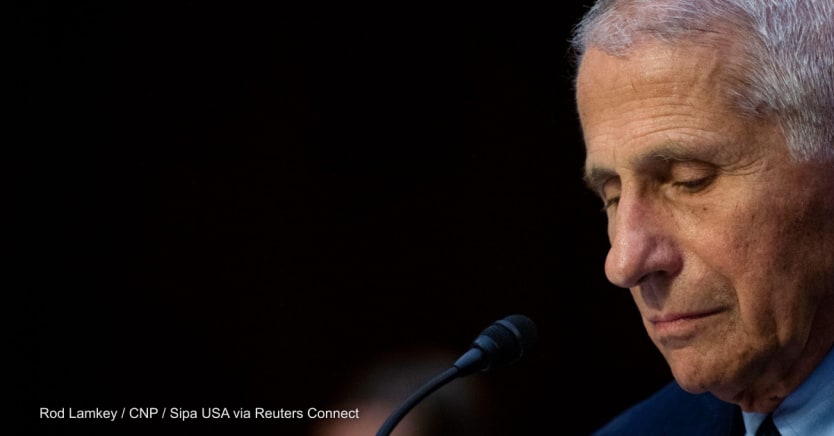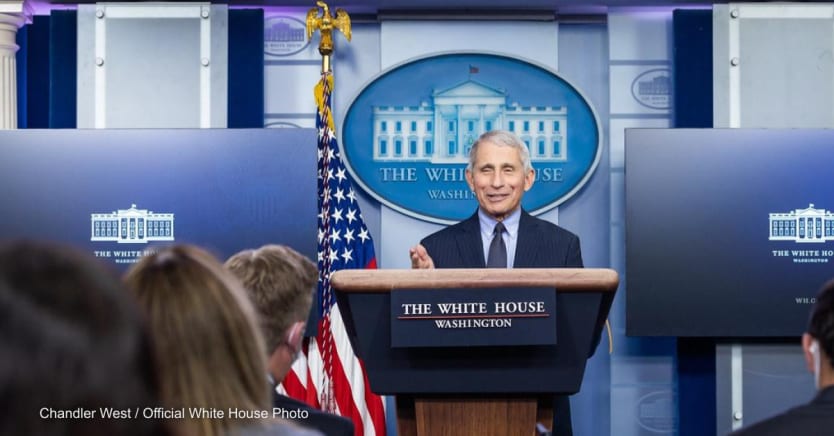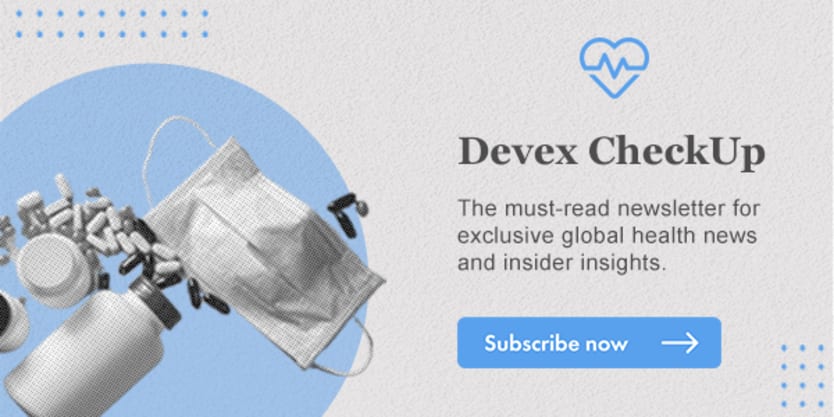
When Dr. Anthony Fauci announced that he is stepping down as director of the National Institute of Allergy and Infectious Diseases, or NIAID, and as chief medical adviser to U.S. President Joe Biden in December, news outlets were quick to give a rundown of his career highlights.
He advised seven U.S. presidents, played a significant role in tackling the HIV and AIDS crisis in the U.S., and became the face of the U.S. COVID-19 response.
But Fauci’s contributions to health aren't limited to the United States, his long-time colleagues told Devex. He has also served as a mentor to many scientists and global health leaders working in the country and abroad, making it one of his biggest legacies.
But while he’s proud of the work he’s done, especially in getting HIV treatments to people in low- and middle-income countries, he tells Devex that more needs to be done to achieve equity in access to health care globally.
“Equity is a very important concept. We are getting closer to that in some countries. But there are still big gaps,” he said.
Work on PEPFAR
Fauci is known to be the chief architect behind PEPFAR — the U.S. President's Emergency Plan for AIDS Relief — a flagship U.S. program launched by former President George W. Bush to address the HIV and AIDS crisis that’s killing people in low-resource settings. Since 2003, PEPFAR has invested nearly $100 billion in the global HIV and AIDS response, helping save millions of lives.
Dr. Jean William Pape, founder of GHESKIO — a Haiti-based research, treatment, and training center for HIV and other diseases that receive NIAID funding — recalled how Fauci called him to join a small group of experts in convincing Bush of the need for PEPFAR. He was scheduled to give a talk in Brazil, but delayed that and flew to Washington instead.
“He [Fauci] said you're going to meet with the administration, it's essential that you indicate that people from the developing world can benefit from AIDS treatment,” Pape told Devex.
At that time, some U.S. officials and pharmaceutical industry executives were pointing out that people in low-income countries wouldn’t be able to take antiretroviral drugs as prescribed, which could lead to HIV resistance. And they could bring that resistant virus to the U.S. when they travel.
Today in Haiti, Pape said HIV and AIDS are no longer the primary cause of death, thanks to PEPFAR’s investments.
“Our patients are dying of cardiovascular disease, which has become the main cause of death [and] no longer HIV/AIDS. So I think that this is a huge accomplishment for the PEPFAR program,” he said.
From our archives:
Q&A: PEPFAR architect Anthony Fauci on the initiative's transformational impact
On the 15th anniversary of the creation of PEPFAR, Devex spoke to Dr. Fauci about its impact on U.S. global health — and how the initiative can adapt to daunting new challenges in the fight against HIV and AIDS.
Winnie Byanyima, UNAIDS’ executive director, said many people are alive today “because of Tony.”
“It would have been easy for Dr. Fauci to focus only on the United States and his huge impact there. But Dr. Fauci responded to calls by activists to ensure that Africans could access the same science and the same treatment [for HIV]”, she said in a written response to Devex.
Fauci’s work in helping tackle HIV and AIDS globally didn’t start or end with the launch of PEPFAR. He’s been involved in HIV and AIDS research long before and has voiced support for the importance of PEPFAR as well as the Global Fund to Fight AIDS, Tuberculosis and Malaria.
Speaking with Devex this week, Fauci said that he’s most proud of advising seven U.S. presidents, being entrusted to help put together PEPFAR, and being able to fund lifesaving treatments for HIV as director of NIAID. A lot of that work, he said, was driven by his feeling of empathy for those afflicted by the disease globally.
But while there are now several effective therapies for the prevention and treatment of HIV, many people still don’t have access to these lifesaving treatments.
“We've got to continue to push the envelope to get them those resources. We do it through the Global Fund. We do it through PEPFAR. But also, we got to challenge the leaders in countries that are not putting enough resources into the health of their citizens,” he said.

The search for an effective HIV vaccine
Over the years, Fauci has helped advance the search for an effective HIV vaccine. Under his leadership, NIAID has supported many HIV vaccine trials, including an ongoing first-phase clinical trial to evaluate three messenger RNA-based, experimental HIV vaccines.
HIV vaccine network using faith to expand clinical trial enrollment
The HIV Vaccine Trials Network wants to lay the groundwork so that diverse populations in the United States are comfortable with participating in clinical trials for HIV vaccines. They are doing this through a network of faith leaders.
In 1999, Fauci and Dr. Larry Corey co-founded the HIV Vaccine Trials Network, which is a network of clinical sites in the U.S. and globally dedicated to developing a preventive HIV vaccine. The same network has been useful in conducting studies of COVID-19 vaccines during the pandemic.
Today, 80% of the world’s HIV vaccine research is done by HVTN, and they now have more clinical sites outside of the U.S., Corey said.
“Tony's been the most important advocate for HIV vaccines, I think, globally,” he said, adding that NIAID puts a lot more money per year into HIV vaccines than anywhere else in the world.
He hopes that doesn’t change with Fauci leaving NIAID.
“We've built a long-lasting infrastructure. He's built a long-lasting infrastructure through us. And I think that will continue,” he said.
Decades of work have gone to finding an effective HIV vaccine. Asked if that frustrates him, Fauci said it’s a “remaining challenge.” Unlike other infections such as measles and polio, HIV is an unusual virus to which the body doesn’t readily make an adequate immune response.
“I wouldn't exactly call it a frustration. … You don't want to let the emotion of frustration interfere with your resolve of getting the job done. It's a very formidable scientific challenge,” he said.
“Every life and every person is sacred. So it shouldn't be that because you happen to live in an environment that doesn't have easy access, that you don't deserve that easy access.”
— Dr. Anthony Fauci, chief medical adviser, U.S. presidentSupport for global research
Dr. Fauci’s career, however, isn't defined by a single disease, said Dr. Mark Dybul, a professor at Georgetown University's department of medicine.
While Fauci has often been credited for his work on PEPFAR, Dybul said he and Fauci also worked on another Bush initiative on neglected tropical diseases — the $350 million initiative that Bush announced in 2008 to reduce the prevalence of seven NTDs in 30 countries.
As director of NIAID, he supported basic and clinical research for a range of diseases, including infectious diseases, such as tuberculosis and Ebola, neglected tropical diseases, and cancer. In the fiscal year 2020, NIAID supported research work in 127 countries, with total funding of $719.4 million — the largest chunk of which, at 43.4%, went to sub-Saharan Africa.
“NIAID’s mission is not the rest of the world, it’s U.S. But in Tony’s time at NIAID, they've expanded to a global footprint with their clinical trials networks, a lot of investments in clinical research capacity and basic research capacity in low- and middle-income countries,” Dybul told Devex.
Pape said Fauci helped develop programs encouraging researchers to develop better drugs and better drug combinations for TB prevention and treatment. He was also very supportive of the mRNA vaccine technology transfer hub in South Africa and enabled collaboration between NIAID’s vaccine research center and Afrigen to fast-track the production of the hub’s mRNA vaccine candidate, said Professor Petro Terblanche, Afrigen’s managing director.
The must-read weekly newsletter for exclusive global health news and insider insights.
NIAID has also signed a collaborative research and development agreement with Afrigen to develop a pipeline of mRNA vaccines focused on diseases affecting low- and middle-income countries, she said.
Fauci, however, said that investments NIAID has made in research all these years have yet to achieve equity.
“No, we have not achieved what I think is the ultimate goal — equity in access to health care throughout the world,” he said, recalling it as the “big vision” of his friend and colleague Paul Farmer, who passed away early this year.
He said Farmer believes that everyone should have access to healthcare and lifesaving medications, regardless of where they live.
“Every life and every person is sacred. So it shouldn't be that because you happen to live in an environment that doesn't have easy access, that you don't deserve that easy access. Everyone does,” Fauci said.
Fauci could have focused his efforts in the U.S., but his upbringing, including his Jesuit education, has taught him to be in service to others, he said. That inspired him to take up medicine as a career, as well as in putting resources to diseases affecting many people globally.
Paul Farmer's lasting legacy: The quest for equity in global health
Dr. Paul Farmer approached health crises both as a physician and also as a medical anthropologist determined to understand the political and social causes that created the “medical deserts” in which the emergencies occurred.
“When I started to learn about the fact that diseases are rampant throughout the world, then I became very interested in global health. And then when I became director of the Institute … I felt I could use all of my energy, my passion, and the resources that I control as director of the Institute to make sure we paid very strict attention to global health,” he said.
A mentor
One of Fauci’s lasting legacies, however, would be serving as a mentor to many, including Dybul himself, who said he would often go to Fauci for advice when he led PEPFAR, as well as when he served as executive director of the Global Fund which, back then, struggled with corruption issues.
Fauci taught him how to communicate complex issues to a larger audience, including to politicians, and be honest with data, including what he doesn’t know, Dybul said.
“What I learned from him is that know your topic well enough that you can explain complicated issues in very understandable terms to lay people quick[ly]. As he always taught me, you have five minutes with a key policymaker to grab their attention and explain what needs to be done and why. And if you can't do that, you're not going to succeed,” Dybul said.
Nkengasong's vision for PEPFAR in an 'era of multiple pandemics'
U.S. Global AIDS Coordinator Dr. John Nkengasong says the U.S. government's HIV initiative has built a platform that can be leveraged to detect, control, and respond to other disease outbreaks.
Many commentators regard Fauci as an excellent science communicator. But he also faced criticism on some of his messaging during the U.S. COVID-19 response, particularly on his early advice to the U.S. public not to wear masks. Later on, Fauci explained the reason behind the advice, saying it was unknown at the time that a large percentage of people who have COVID-19 but were asymptomatic were transmitting the virus, but that he advised masking once the facts were established. But some argued that messaging led to confusion and could’ve been handled better.
Fauci said getting across science facts amid a proliferation of fake news, lies and “very serious distortion of reality” today is challenging. But young scientists should stick with the data, be consistent in their messaging, know their audience, and have very clear messaging that doesn’t confuse people.
“I have a tenet that I go by that I learned early on, which I call precision of thought and economy of expression. Be precise in what your message is, and say it in as few words as possible, so that you don't wind up meandering off and confusing people,” he said.
Some of his long-time colleagues think he deserves a break from the public eye, but don’t see him completely retiring. Others hope they can on occasion call him for guidance.
“I know his telephone number, and I know where he lives, and I know where he hangs out. So when we need his advice, we'll call him on the phone just like we have in the past,” Corey said.
But Fauci said he still doesn't know where he’s headed next. He wants to make that decision after stepping down from his current position to avoid any conflict of interest.
But he thinks he could utilize his decades of experience in government to inspire the younger generation of scientists to consider a career in public service, particularly in public health.
“Because we need more young people to get involved in science, particularly in the arena of public health. And hopefully, my life story might inspire young people to do that. And since I feel I have at least a few more years of energy and passion and commitment, that's what I'd like to do for the next five years or so,” he said.









